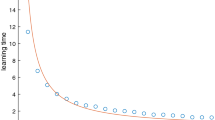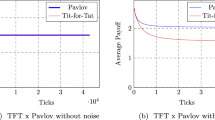Abstract
This paper approaches the analysis of a repeated Principal-Agent model introducing automata as a device for decision making. We use “modified” Genetic Algorithms methods to analyze the process of evolution in such a model. It is argued that the above modifications furnish the analysis with an interpretation that is more suitable to the study of social systems.
Access this chapter
Tax calculation will be finalised at checkout
Purchases are for personal use only
Preview
Unable to display preview. Download preview PDF.
Similar content being viewed by others
References
Aumann, R.J. (1981). Survey of Repeated Games. In R.J. Aumann et al. (eds.) Essays in Game Theory and Mathematical Economics in Honor of Oscar Morgenstern. Mannhein: Bibliographisches Institut.
Goldberg, D.E. (1989). Genetic Algorithm in Search, Optimization and Machine Learning. New York: Addison-Wesley.
Holland, J.H. (1975). Adaptation in Natural and Artificial Systems. Ann Arbor: The University of Michigan Press.
Lambert, R.A. (1983). Long Term Contracts and Moral Hazard. Bell Journal of Economics14, 441–463.
Miller, J.H. (1989). The Coevolution of Automata in the Repeated Prisoners Dilemma. Manuscript. Carnegie-Mellon University.
Rubinstein, A. (1986). Finite Automata play the Repeated Prisoners Dilemma. Journal of Economic Theory39, 83–96.
Author information
Authors and Affiliations
Editor information
Editors and Affiliations
Rights and permissions
Copyright information
© 1997 Springer-Verlag Berlin Heidelberg
About this paper
Cite this paper
Vilà, X. (1997). Adaptive Artificial Agents Play a Finitely Repeated Discrete Principal-Agent Game. In: Conte, R., Hegselmann, R., Terna, P. (eds) Simulating Social Phenomena. Lecture Notes in Economics and Mathematical Systems, vol 456. Springer, Berlin, Heidelberg. https://doi.org/10.1007/978-3-662-03366-1_35
Download citation
DOI: https://doi.org/10.1007/978-3-662-03366-1_35
Publisher Name: Springer, Berlin, Heidelberg
Print ISBN: 978-3-540-63329-7
Online ISBN: 978-3-662-03366-1
eBook Packages: Springer Book Archive




